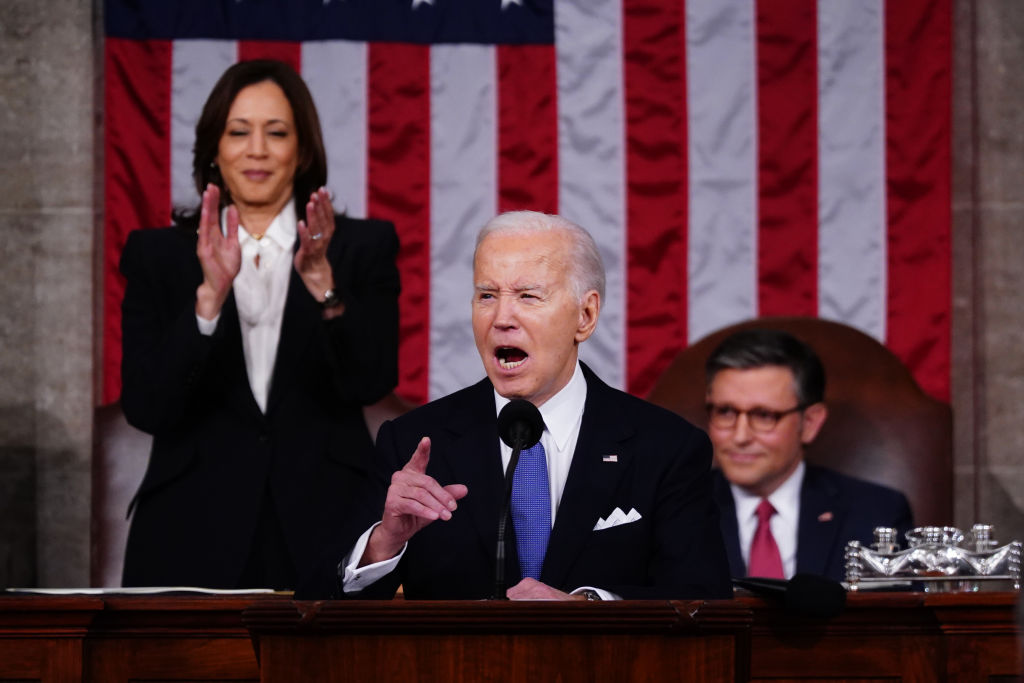Happy Friday! We’d like to give a hearty Dispatch welcome to Will Rinehart, who launched a new technology-focused newsletter, Techne, with us yesterday! You can read the first edition here to see what it’s all about—and click “Subscribe to the newsletter” at the top of this page to ensure you never miss an issue going forward.
Quick Hits: Today’s Top Stories
- Hamas stepped away from ongoing ceasefire and hostage deal negotiations on Thursday after the terrorist group’s Gaza leader, Yahya Sinwar, emerged from seclusion to demand that Israel commit to a permanent end to the war. A six-week pause in fighting was on the table, in addition to the exchange of hundreds of Palestinian prisoners for roughly 40 hostages taken by Hamas during the October 7 attack on Israel. Hamas’ delegation left the latest round of talks in Cairo, mediated by Qatar and Egypt, yesterday, likely ending hopes for an agreement before the Muslim holy month of Ramadan, which starts around Sunday—though U.S. Ambassador to Israel Jack Lew expressed optimism that negotiations would resume. The Israeli delegation boycotted the latest round of talks after Hamas failed to produce a list of remaining living hostages.
- President Joe Biden announced during his State of the Union address Thursday night that the U.S. would build a temporary pier on Gaza’s Mediterranean coast in an effort to boost the delivery of humanitarian aid. The “emergency mission,” which Biden said would not require U.S. boots on the ground in Gaza, would include a large-scale amphibious military operation to create a temporary port that could receive food and other vital supplies by sea.
- Sweden formally became the 32nd member of the North Atlantic Treaty Alliance (NATO) on Thursday after delivering its accession documents to Washington, D.C. “We will strive for unity, solidarity, and burden-sharing, and will fully adhere to the Washington Treaty values: freedom, democracy, individual liberty and the rule of law,” Swedish Prime Minister Ulf Kristersson said in a statement yesterday. Sweden’s flag will be raised in a ceremony at NATO headquarters in Brussels on Monday.
- The House of Representatives on Thursday passed the Laken Riley Act, a bipartisan bill named for the University of Georgia student who was killed by an illegal immigrant last month. The bill—which passed 251-170 with 37 Democrats joining all present Republicans to vote in favor of the bill—would require federal immigration authorities to detain any undocumented migrant facing local burglary or theft charges. The man charged with Laken’s killing, Jose Ibarra, is an illegal immigrant from Venezuela who was arrested and released in New York City for acting in a manner to injure a child, and received a citation in Georgia for misdemeanor shoplifting. The bill’s fate in the Senate is uncertain.
The State of the Union is Angry

The tone of last night’s State of the Union address was set perhaps even before President Joe Biden delivered a word of his speech. Protesters, pushing for a ceasefire in the war in Gaza, blocked a portion of Pennsylvania Avenue leading to the Capitol Building. GOP firebrands like Reps. Marjorie Taylor Greene of Georgia and Lauren Boebert of Colorado signaled early on Thursday that they would not heed Speaker Mike Johnson’s calls for decorum. And as Biden proceeded to the dais, Greene pulled on a MAGA hat—against Congressional rules—and handed him a button embossed with the name of Laken Riley, a 22-year-old nursing student killed last month in Georgia by an illegal immigrant.
The annual speech was delivered with just 243 days until November’s presidential election, and the specter of the campaign hung over the room as the president and congressional Republicans traded barbs throughout the night. Biden referenced his predecessor—and once-again political rival—more than a dozen times over the course of the night, using the address to make his reelection pitch. In substance, Biden’s remarks were about par for the Democrat’s course; stylistically, however, the direct partisan rancor coming from both sides previewed the long and bruising election cycle that lies ahead.
Biden headed into his address with …
As a non-paying reader, you are receiving a truncated version of The Morning Dispatch. Our full 1,931-word story on last night’s State of the Union address is available in the members-only version of TMD.
The American People Should Demand Better
We don’t publish many editorials here at The Dispatch, but the fourth one in our company’s history went live this morning, arguing the American people “should demand better than the decision our two decaying, corrupted parties—channeling the dueling forces of tribalism and inertia—are set to thrust upon them.” The entire piece is out from behind the paywall, and we hope you’ll take a few minutes this morning to read and share it. Here’s an excerpt:
As we move toward the general election, the pressure from partisan cheerleaders to line up behind one of these two unfit men will only grow louder. Progressive commentator Robert Reich, for example, has spent months encouraging people who actively dislike Biden to vote for him anyway as the “lesser of two evils.” On Wednesday, prominent right-wing radio host Hugh Hewitt pushed Nikki Haley to offer Trump a “full-throated endorsement” and “promise to campaign hard for him” because “that’s the traditional GOP way.”
Look where the “lesser-of-two-evils” mindset and the “traditional GOP way” have gotten us: a contest between the most unpopular presidential nominees in the history of polling.
Politicians respond to incentives. We’ve arrived at this point because the disaffected majority of voters who are fed up with today’s political climate have consistently held their noses and settled for candidates they don’t like who have been imposed upon them by the hyperpartisan fringes. In the United States, a shockingly small percentage of the overall electorate determines the two major parties’ nominees. The country will never return to the smoke-filled rooms of the past, but the tyranny of the most rabidly partisan doesn’t strike us as much of an improvement.
We understand and respect that Americans will respond to the dismal choice in front of them in different ways—for different reasons—but we encourage them to weigh their options carefully, clear-eyed about the potential ramifications of either man securing a second term and on guard against the natural impulse to justify their vote by turning a blind eye to the candidates’ obvious flaws. No matter who wins, we will desperately need as many people as possible who can still tell the difference between good and evil, right and wrong, truth and lie. In a democracy, such people are the only guardrail against tyranny.
We’re under no illusion that our words here will meaningfully alter the outcome in November. If we had more sway, the country wouldn’t be in this position. And we host a podcast called The Remnant for a reason.
But we do know that that “remnant”—Americans who believe in individual liberty, pluralism, and a U.S.-led global order—is much larger than the leaders of either major political party think. And if enough of these voters break free of their partisan shackles, change may not come immediately—but it will come. To paraphrase a recent piece from our colleague, Nick Catoggio, all that’s to be done is to forge ahead, speak the truth, and trust that doing so will matter somehow.
And that is what we will continue to do.
Worth Your Time
- Writing for Law and Liberty, Rachel Lomasky, a data scientist working in artificial intelligence (AI), argued for a longer view on AI development. “Recent advances in AI are truly significant, but the hype is overblown,” she wrote. “[Generative] AI passes the Turing Test, relatively non-controversially, and is also acing tests meant to measure human knowledge, e.g., the LSAT and AP Exams. It obeys Amara’s Law, which states, ‘We tend to overestimate the effect of a technology in the short run and underestimate the effect in the long run.’ AI will continue on its current, mostly mundane, somewhat delightful course, but the pace will accelerate. The trajectory of Gen AI is promising, but it would be a big mistake to extrapolate too far. This is not the first time people have worried that artificial human-level intelligence might be within sight. … So what’s next? Nobody is sure, although everyone seems to have an opinion. The only definite thing is that AI will take us in unexpected directions. Who would have thought thirty years ago that everyone would have a phone in their pocket, and yet nobody would call each other?”
Presented Without Comment
To prepare for last night’s State of the Union address, President Joe Biden sought advice from actors who played fictional presidents, including Morgan Freeman (Deep Impact) and Bill Pullman (Independence Day).
Also Presented Without Comment
Washington Post: TikTok Users Flood Congress with Calls as House Weighs Potential Ban
Individual House offices have since received hundreds of calls from TikTok users, at times fielding upward of 20 a minute, according to eight congressional aides, who spoke on the condition of anonymity to describe the outreach. The volume has been so immense that some offices resorted to temporarily shutting off phones, two aides said, while others struggled to field unrelated calls.
The episode began just hours before lawmakers advanced a bill explicitly targeting TikTok and other apps they accuse of being “controlled” by foreign adversaries, such as China. The proposal could force TikTok’s China-based parent company to sell off the app or block it entirely in the United States. The legislation sailed out of the House Energy and Commerce Committee unopposed Thursday afternoon, 50-0, in a sweeping bipartisan rebuke of the app.
Toeing the Company Line
- Sarah, Steve, David, John, and Declan discussed the State of the Union address and took questions from audience members on last night’s late-night episode of Dispatch Live (🔒). Members who missed the conversation can catch a rerun, either video or audio-only, by clicking here.
- Alex fact-checked a recent HuffPost story that stripped context from comments made by North Carolina Lt. Gov. Mark Robinson about women and voting.
- In the newsletters: Will Rinehart introduced his new tech-focused newsletter for The Dispatch, Mike and Sarah recapped Monday’s Supreme Court ruling and checked in on all the various Biden investigations in The Collision, and Nick previewed (🔒) the upcoming post-filibuster age.
- On the podcasts: Jonah, David, and Adaam review Denis Villeneuve’s Dune 2 on The Skiff (🔒).









Please note that we at The Dispatch hold ourselves, our work, and our commenters to a higher standard than other places on the internet. We welcome comments that foster genuine debate or discussion—including comments critical of us or our work—but responses that include ad hominem attacks on fellow Dispatch members or are intended to stoke fear and anger may be moderated.
With your membership, you only have the ability to comment on The Morning Dispatch articles. Consider upgrading to join the conversation everywhere.